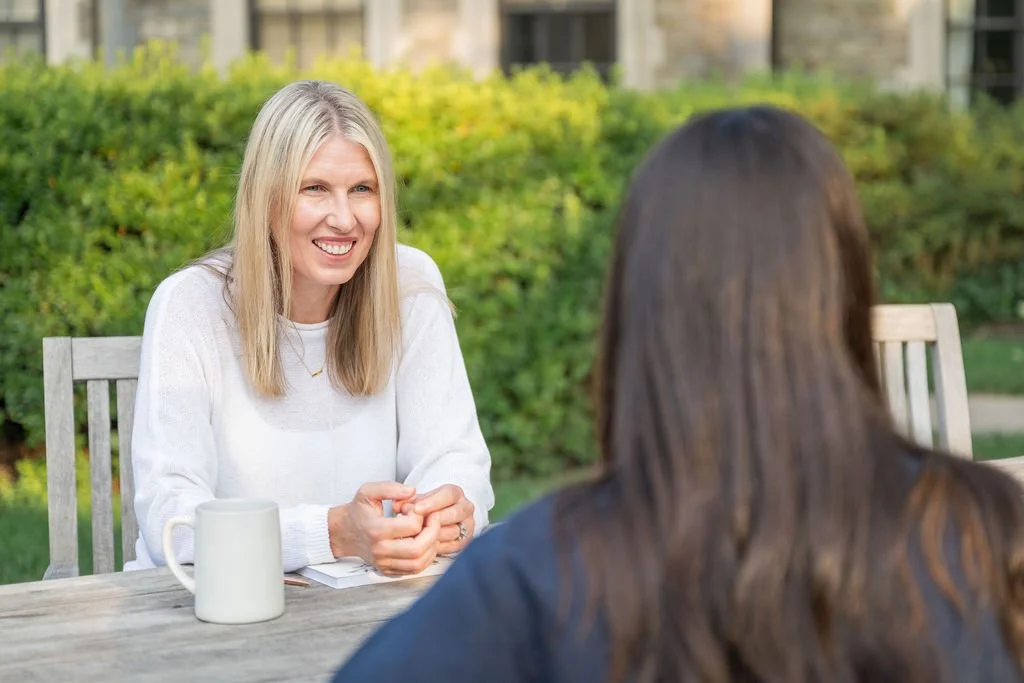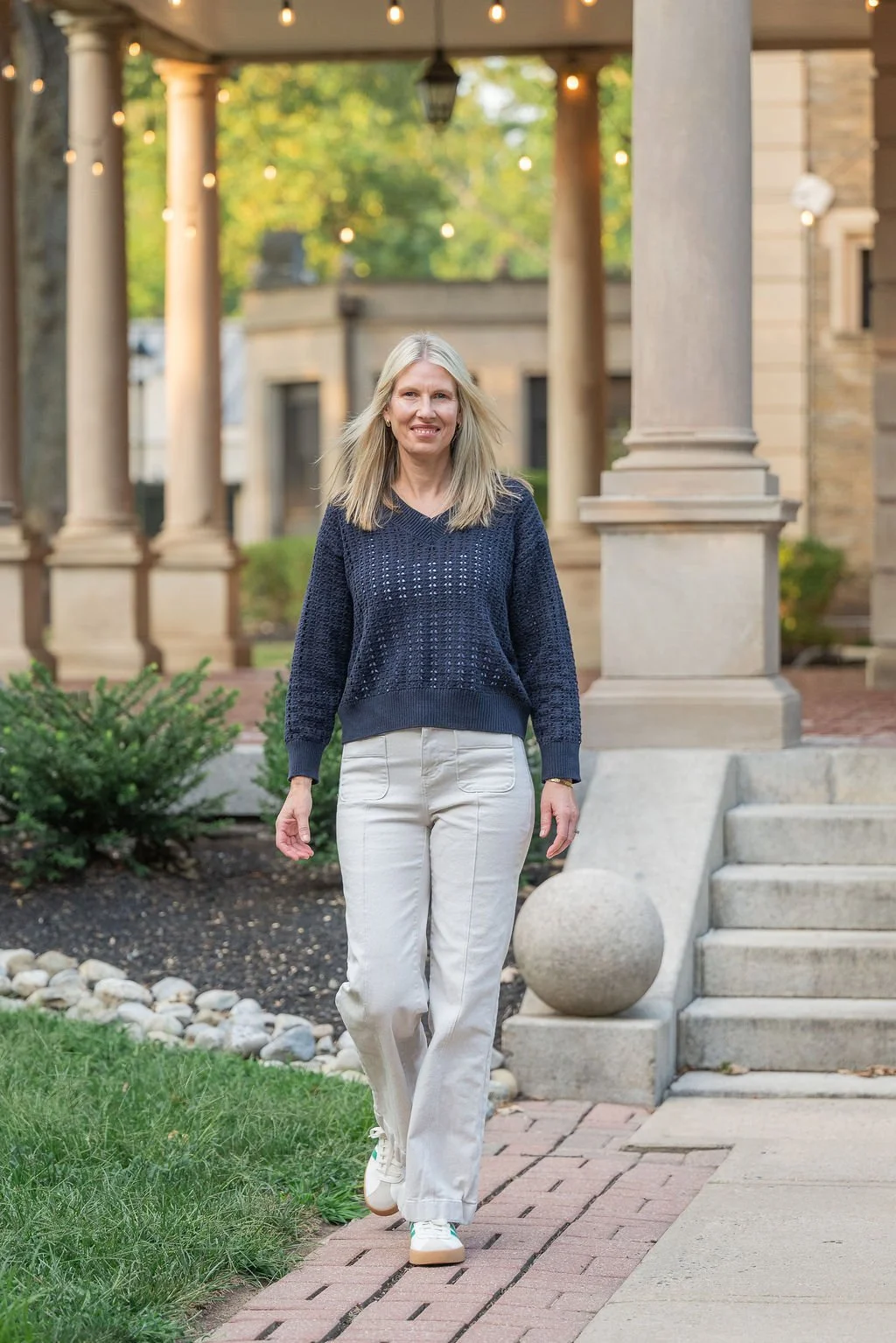
is life coaching right for your teen? here's what you need to know
If you're reading this, you've probably noticed something shifting in your teen. Maybe they're struggling with confidence, feeling stuck, or searching for direction. Maybe you can see their potential, but they can't quite see it themselves yet.
You might be wondering: Could life coaching help?
Let me share what I'm witnessing in my teen group coaching program—and why the group component might be exactly what your teen needs.
What Every Teen in My Program Has in Common
Here's something beautiful: every single teen who joins my program shares one thing—they believe in the possibility of change.
Some have crystal clear desires. They know exactly what they want: better grades, more confidence, stronger friendships, clarity about their future.
Others have cloudier desires. They just know something needs to shift. They feel pulled toward growth even if they can't name it yet.
Here's what matters: both are ready. And both are powerful starting points.

why advice alone doesn’t work and what teens really need
You know that feeling when your teen comes to you with a problem, and your first instinct is to fix it for them? I get it, we all want to help, to steer them away from mistakes, to make life a little easier. But here’s the thing: the more we step in with advice, the less our teens learn to trust themselves.
Teens today are surrounded by opinions—parents, teachers, friends, social media. Everyone seems to have a say in what they “should” do. And while guidance can be helpful, it doesn’t build the one thing that really matters: self-trust.
Here’s what teens are often missing:
Listening to themselves. Their gut feelings, their preferences, their instincts. These are the compass points they need to practice following.
Tolerating uncertainty. Life doesn’t come with instructions. Being comfortable not knowing the outcome is a superpower.
Making choices without needing approval. It’s tempting to ask everyone what they think. Learning to decide for themselves is a huge confidence booster.
Trusting they can handle the outcome. Mistakes aren’t failures, they’re lessons. Every challenge they navigate on their own builds resilience.
When we jump in too quickly, we may solve a problem in the moment—but we miss the chance to strengthen that self-trust. And without it, indecision keeps coming back, like a pesky homework assignment you just can’t shake.

a little note to myself (and maybe to you too)
Last week I was supposed to host my first group call.
I was excited in that quiet, proud way. The kind where you think, I’m actually doing this. I had spent time preparing, thinking about what I wanted to say, how I wanted people to feel when they logged off. I logged on early, coffee nearby, notes open.
And then… it didn’t work.
Something technical went wrong. I still don’t totally know what. I tried everything I could think of. Clicking. Refreshing. Logging out. Logging back in. Watching the minutes pass and feeling my chest get tighter by the second.
I wanted to cry. I wanted to throw my laptop. Mostly, I wanted time to rewind five minutes so I could somehow magically fix it.
But I couldn’t.
The call never happened.
After, I was so hard on myself….really hard on myself.
I replayed the moment over and over, thinking about what I should’ve done differently. How embarrassing it felt to care so much and have it fall apart anyway. That familiar voice showed up quickly — the one that says, You should know better.
I sat with that feeling longer than I needed to.
Eventually, though, something softened.
I realized: I did prepare. I did care. I did show up early and try. The thing that went wrong wasn’t a character flaw. It was a tech issue I hadn’t experienced before.
And honestly… mistakes happen.
That doesn’t mean I failed. It means I’m human and learning as I go.
I shared this with my teen clients.
Not because it was a great success story but because it wasn’t.
We talked about how fast our brains jump to self-blame when something doesn’t go as planned. How easy it is to turn one moment into a story about who we are. How caring deeply can make mistakes feel so much heavier.
And we talked about the skill of staying kind to yourself in those moments. Of saying, This didn’t work… and I’m still okay.
I could see it land.

instant gratification vs. the muscle of becoming
I’ve been having a lot of conversations lately with teens and their parents about instant gratification.
And let’s be honest… it is pretty amazing.
You can order food on an app and 30 minutes later it’s at your door. Amazon delivers the same day. Entire seasons of shows can be binge‑watched in a weekend.
This is the world our teens have grown up in.
When Waiting Was Part of Life
When we were growing up, binge‑watching wasn’t a thing. You waited a full week for the next episode. Delayed gratification was built into everyday life without us even realizing it.
Today, waiting is almost optional.
And that shift matters.

endings,new beginnings,and a little bit of rotting
After the fullness of Christmas, one of my favorite times of year begins.
The rotting.
(As my kids call it.)
As an introvert, all the festive activities, family gatherings, busy stores, and constant movement leave me craving the quiet after. That sacred stretch between Christmas and the New Year when there’s nowhere to be, nothing to rush, and permission to reset, recharge… and yes, rot.
This week, I finally had the energy to open a book. It’s called The Let Them Theory by Mel Robbins, and wow, so many good takeaways. But one line has really wrapped itself around my heart. Mel references a poem by Mary Oliver, The Summer Day, which asks this simple yet powerful question:
“Tell me, what is it you plan to do with your one wild and precious life?”

it’s their journey - not ours
One of the most powerful truths I’ve learned from working with teens is this:
Their life is their journey to have.
Not the one we imagined for them.
Not the one that fits our norms, fears, or expectations.
Theirs.
And wow… that is so much easier to write than to live.
I’ve seen this play out over and over again in my sessions. So many of my teen clients struggle with the pull between their own dreams and desires and what their parents, families, or social norms expect of them. Being a teen is hard enough. Add the pressure to “make the right decisions,” “do the practical thing,” or “follow the family plan,” and the weight becomes overwhelming.
And here’s the heartbreaking part:
Many teens are terrified of making the wrong choice.
So they freeze.
They don’t decide at all.
They stay stuck.
And then they tell themselves they’re not good enough because they don’t know what to do.
The truth is, they won’t know what to do until they take steps forward.
That’s how clarity comes — through movement, not perfection

supporting my teen through the tough stuff… and knowing when to call them out
These last couple of weeks with my teen have been an emotional roller coaster, the kind where one minute your heart is breaking for them, and the next minute you’re so frustrated you could scream. Parenting a teen is not for the faint of heart, and when they’re going through something tough, it can feel like you’re riding every high and low right alongside them.
And as much as I want to jump in and fix it all and wrap her up, protect her, rescue her, I have learned (the hard way) that fixing is not what she needs from me most of the time.
What she needs is me.
My presence.
My support.
My calm.
My messy, human love.
She needs me to sit with her emotions without loading mine on top.
She needs me to listen without rushing in with solutions.
She needs me to hold space so she can actually feel what she’s feeling and work through it in her own time.
But here’s the part that’s true and not talked about enough:
There’s also a time……a very REAL, very important time when holding space isn’t enough.

why your teen isn’t listening — and how to finally get through
If you’ve said the same thing a dozen times and your teen still isn’t listening, you’re not alone. It’s frustrating and exhausting. But here’s the thing: it’s not that your teen doesn’t hear you. It’s that your message isn’t landing.
Why Teens Tune You Out
I’ve talked to hundreds of teens, and they admit they tune out for all kinds of reasons and I got the inside scoop.
They shut down when they feel lectured, controlled, or misunderstood. Even when your words come from love, teens sense the energy behind them. If it feels like frustration or worry, they tune it out to protect themselves.
So what they hear isn’t your message, it’s “You don’t trust me” or “You’re disappointed in me.” And that’s when the walls go up.

celebrating my clients’ wins
I am so blessed to be a witness to the growth and transformation of my teen clients! I absolutely love what I do, and to see these incredible young people begin to realize that they have the power to create the lives they want — right now, not someday in the future, is such a gift!
Each week, I get to walk alongside teens who are learning that they don’t have to wait until adulthood to live with confidence, joy, and purpose. Watching them step into their strength and discover what lights them up is nothing short of amazing.
✨ One client came to me feeling overwhelmed: constantly making lists, overthinking every step, and feeling stuck in the cycle of “what’s next?” She wanted to get off the hamster wheel. Fast forward one month, and she’s not only feeling more confident and grounded in her own skin, but she recently went from running 7 miles to completing a 13.1-mile half marathon! The best part? She felt light, present, and fully able to enjoy the journey. What a win!

the dance of independence: learning to let our teens lead
The other night, my daughter and I were curled up on the couch watching Dancing with the Stars. We were laughing at some of the dramatic spins, guessing who might get voted off, and commenting on who clearly carried the rhythm (and who didn’t). Somewhere between a quickstep and a waltz, I found myself thinking, this is exactly what parenting teens feels like.
